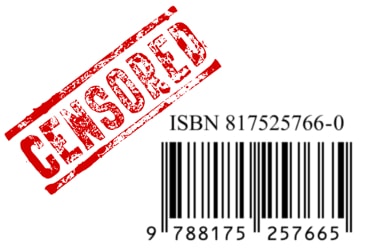
Is red-taping and censorship slowing down the ISBN allotment?
The ISBN online portal was launched last year to ensure that all publishers and self-publishing authors are able to know about the importance of ISBN and apply for it online. They promised timely and efficient providing of ISBN but turned out to be just the opposite. Quite a lot of people have sent complaints to the ISBN International Agency against red-taping and censorship in the process.
The ISBN International Agency has issued serious threats to the HRD ministry that it is considering to revoke the ministry’s appointment as the agency for issuing ISBNs in India. International Standard Book Numbers is meant to provide identity to authors and publishers to sell their books around the world. Has the process actually slowed down under MHRD?
Yes1. CensorshipThe ministry seeks every details of the book before issuing the ISBN. The publishers are required to provide the book jacket, which carries synopsis and blurbs from authors. This could lead to censorship which has become so much more equivalent to censoring almost everything that comes under its autonomy.
2. DelayThe process under HRD ministry is taking longer than required or allowed for securing ISBN for books. Many publishers have complained that the process is taking so long that they have to survive on previous stock of ISBN but in a few more months this is going to lead to serious crisis in the publishing industry of India which is not the least bit motivating to youth.
3. Irresponsible ministryThere is no response to the email queries from the ministry. The process which is supposed to take only 2 or 3 weeks is taking up to 3 months. To top it up, there is a restriction of only 10 ISBN allotted in one go rather than the previous lot of 100. At this rate, the publishing industry will slow down to a great extent. New writers will face crisis of being published.
4. Lack of books in print listingWhile it is being argued that the details are required to include them in the books in print listing or database, it is a known fact that Indian agency does not have any such listing or database and hence the details and the amount of time taken to issue ISBN is being looked down upon as red-taping and censorship that is being done to bound the freedom of publishers and authors.
5. Not differentiatingThe application process is non-practical as it doesn’t consider the vastly different legal entities who engage in publishing in India for instance, private companies, universities, organisations, trusts, etc. There is no set of rules for identifying them and hence the ministry often functions arbitrarily, asking some publishers to first have their publications verified by other government authorities. This leads to serious delays.
No1. Important detailsThe process of seeking full details is important to collect metadata about each book in order to make sure that the publication qualifies for ISBN. It has to be ensured that it is text-based, monographic and available to the public. The details are also required so that it could be included in a “books in print” listing or database.
2. WastageThe government has written back to ISBN international agency that out of the 78,000 unique codes issued to publishers till date, only half of them have been used for publishing books. It is an unnecessary issue being raised by the publishers against the government only to throw hints of censorship for no reason. The fact that publishers have previous stocks of ISBN shows that they were lying idle, wasted and unused.
The government agency is performing inadequately which makes it fair for the international agency to issue warning and look into the matter to ensure that the publisher’s woes are answered and solved.